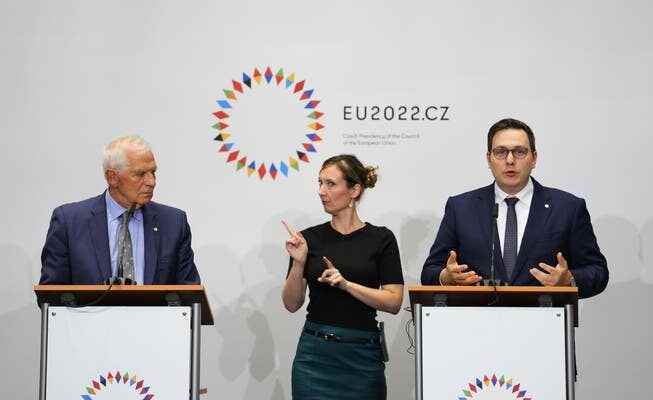The European Union agrees that entry into the EU for Russians should be made more difficult. This also affects Switzerland as a Schengen member. A complete visa stop, as the Balts, Poles and Scandinavians want, is not in sight.
EU foreign policy chief Josep Borrell and Czech foreign minister Jan Lipavski during a press appearance on Wednesday.
The European Union will suspend an agreement concluded with Russia to facilitate the issuing of visas for tourists. All 27 foreign ministers in the bloc agreed on this on Wednesday. The step will ensure that the number of new visas for Russian citizens falls significantly, said EU foreign policy chief Josep Borrell after a ministerial meeting in Prague. Since mid-July there has been a “significant increase in border crossings” from Russia to the EU, which pose a “security risk for neighboring countries”.
“Hateful Rhetoric”
A possible entry ban for Russian tourists had been hotly debated in the run-up to the meeting. Several countries, including the Baltic States, Poland and Finland, actually wanted to achieve a complete visa ban. The Czech government, which currently holds the presidency of the EU, had also advocated closing the external border for all Russians.
In a confidential letter to the other EU states, the government in Prague argued that not only the political elite, but all Russian society supports the course of their government and “its hateful, anti-Western and anti-European rhetoric”. According to the position paper, up to 80 percent of Russians are “in favor of the terrible war in Ukraine.” One must therefore send “a clear message”.
The Czechs can point to numerous cases in which Russian tourists in the EU behave aggressively towards Ukrainian refugees or publicly show their support for the war, for example by traveling through Europe with a “Z” on their car or disrupt peace demonstrations. The video of a Russian influencer who mocked two Ukrainian girls on the street in Salzburg became known and yelled “Fuck off your Ukraine” after them.
Germany and France in particular, but also several countries dependent on tourism, such as Greece, opposed a complete travel ban for Russians. From Berlin it was said that the Russian people should not be punished collectively for Vladimir Putin’s war against Ukraine. Together with the French government, the German traffic light coalition had written its own paper that ascribed democracy-promoting forces to tourism. One should not underestimate the “transformative power”, it says, if travelers had the chance “to experience life in democratic systems first-hand”.
Lowest common denominator
The suspension of the visa facilitation agreement concluded with Russia in 2007 is a minimum compromise, which initially only means that Russian citizens have to pay 80 euros for a visa instead of the previous 35 euros and have to wait much longer for it. In order to accommodate the Eastern and Northern Europeans, it should now at least be examined whether some of the approximately ten million multiple-entry visas with a validity period of several years could be declared invalid.
It is annoying for Russia’s neighboring countries that tourist visas issued to Russians by other EU countries can be used to visit basically any of the 26 countries in the Schengen area. In addition to 22 EU member states, this also includes Switzerland, Norway, Iceland and Liechtenstein. In Prague on Wednesday, all foreign ministers undertook to comply with the rules of the free movement area.
